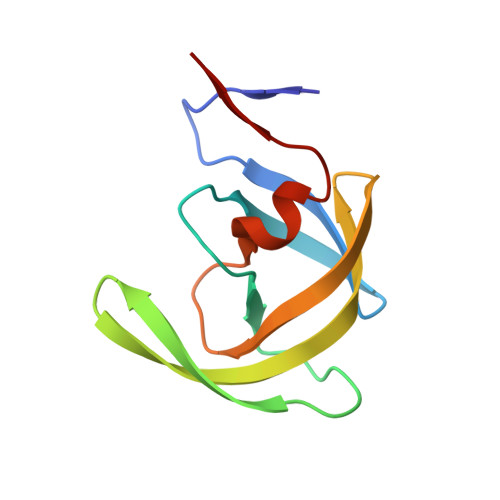Atomic resolution crystal structures of HIV-1 protease and mutants V82A and I84V with saquinavir.
Tie, Y., Kovalevsky, A.Y., Boross, P., Wang, Y.F., Ghosh, A.K., Tozser, J., Harrison, R.W., Weber, I.T.(2007) Proteins 67: 232-242
- PubMed: 17243183
- DOI: https://doi.org/10.1002/prot.21304
- Primary Citation of Related Structures:
2NMY, 2NMZ, 2NNK, 2NNP, 3OXC - PubMed Abstract:
Saquinavir (SQV), the first antiviral HIV-1 protease (PR) inhibitor approved for AIDS therapy, has been studied in complexes with PR and the variants PR(I) (84V) and PR(V) (82A) containing the single mutations I84V and V82A that provide resistance to all the clinical inhibitors. Atomic resolution crystal structures (0.97-1.25 A) of the SQV complexes were analyzed in comparison to the protease complexes with darunavir, a new drug that targets resistant HIV, in order to understand the molecular basis of drug resistance. PR(I) (84V) and PR(V) (82A) complexes were obtained in both the space groups P2(1)2(1)2 and P2(1)2(1)2(1), which provided experimental limits for the conformational flexibility. The SQV interactions with PR were very similar in the mutant complexes, consistent with the similar inhibition constants. The mutation from bigger to smaller amino acids allows more space to accommodate the large group at P1' of SQV, unlike the reduced interactions observed in darunavir complexes. The residues 79-82 have adjusted to accommodate the large hydrophobic groups of SQV, suggesting that these residues are intrinsically flexible and their conformation depends more on the nature of the inhibitor than on the mutations in this region. This analysis will assist with development of more effective antiviral inhibitors.
Organizational Affiliation:
Department of Chemistry, Georgia State University, Atlanta, Georgia 30303, USA.
















